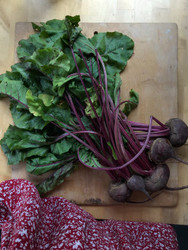Beets: Why These Deeply Colored (Staining!) Root Veggies are Densely Nutritious
Jun 25th 2022

Beets are one of those foods that most people are on polar ends of the spectrum in appeal. The soft, buttery texture of a roasted or steamed beet is what gets most people hooked (I’m a fan if you couldn’t tell by my description). This texture, combined with the slightly sweet but almost savory and salty flavor is what others like. I actually like both of these distinct attributes of this highly nutritious root vegetable.
In fact, if everyone really knew what kind of nutrition and health benefits can be found in this small vegetable, most people would try to include them whether they like them or not. These medium sized roots (and their leaves) really offer a lot in terms of health impact. Add to this the fact that beets are reasonably priced in this day of increasing food inflation, and you’ve got a winner for both nutrition and budget concerns.
The Deeply Pigmented Flesh Offers a Potent Compound
Perhaps the most characteristic property of the beet is its bright red-purple pigment, betalain. The rough skin of the beet holds this pigment in, and should never be scraped or removed if possible before cooking. This dark pigment is the key to the unique health benefits of the beet, and can be destroyed by overcooking or removal of the skin. You can eat the whole thing, skin included and that is what I recommend doing.
Betalain contains an overall nutritional profile that isn’t found in many other vegetables, except in small quantity, and mostly in the typically uneaten portions of other grown foods. Betalain is often found in inedible parts of plants that are ornamentally colored, like flowers. The unique caretenoids found in betalain offer support for the nervous system and function of important organs such as the eyes. Related: Rosemary and Concentration
These pigments also offer unique cancer fighting ability for their high levels of both anti-inflammatory and antioxidant molecules. Studies have shown they inhibit the growth of cancerous tumors by inhibiting “pro-inflammatory” enzymes. In addition, beetroot fiber has been shown to increase white blood cell and antioxidant enzyme circulation, both of which increase our body’s natural cancer-fighting mechanisms.
Rich in brain-boosting, circulation-improving nitrates
Beetroot is also rich in nitrates. Naturally occurring nitrates are excellent for normalizing blood pressure. These nitrates are converted into nitric oxide within the body. Nitric oxide helps to expand the blood vessels, which allows blood to flow more freely throughout the body.
One study showed an almost immediate lowering in blood pressure in participants who drank beet juice. The effect was more noticeable in men. However women also experienced a decrease in blood pressure as well.
Not only are nitrates important in normalizing blood pressure and improving blood flow, they are also important for efficient brain function. Beetroot’s natural nitrate content helps increase the blood flow to the brain.
Blood carries necessary oxygen and other nutrients to the brain. When our blood is flowing freely and unencumbered by constricted or narrowed arteries, veins and capillaries, our brains are able to constantly get the “fuel” they need to effectively reason, concentrate and regulate the various areas of the brain Related: The Neuroprotective Properties of NAC
Detox support
Beets are an excellent food for detoxification. Beetroot fiber contains a more effective “dietary fiber” than other types of fibers in that it contains pectin polysaccharides, which are thought to be more effective at cleansing the digestive tract and keeping everything moving. Not only does the beetroot fiber support colon and digestive health by making elimination easier, it also supports the body’s overall detoxification mechanisms.
The pigments in beets have shown in studies to help trigger enzymatic activity that aids in the excretion of toxins and unwanted materials through our urine. Their unique properties make the transport of these toxins easier by helping to convert them into water soluble “waste”.
So there you have it. And we probably haven't even touched on the myriad of other health benefits of this simple root vegetable. Sure, it's a bit of a pain to work with due to the staining factor (just don't get it on light colored clothes!).
However the economical little nutrition powerhouse should definitely be added to everyone's diet periodically. You just have to figure out how you best like it. Some people even grind raw beets into a smoothie (you'd better have good blades in your blender for this, they are very hard when raw). Whatever your pleasure, beets are a must-have in anyone's diet who is engaging in cancer-preventive or health-supporting dietary habits. Related: Health Benefits of Drinking Alkaline (Low pH) Water

